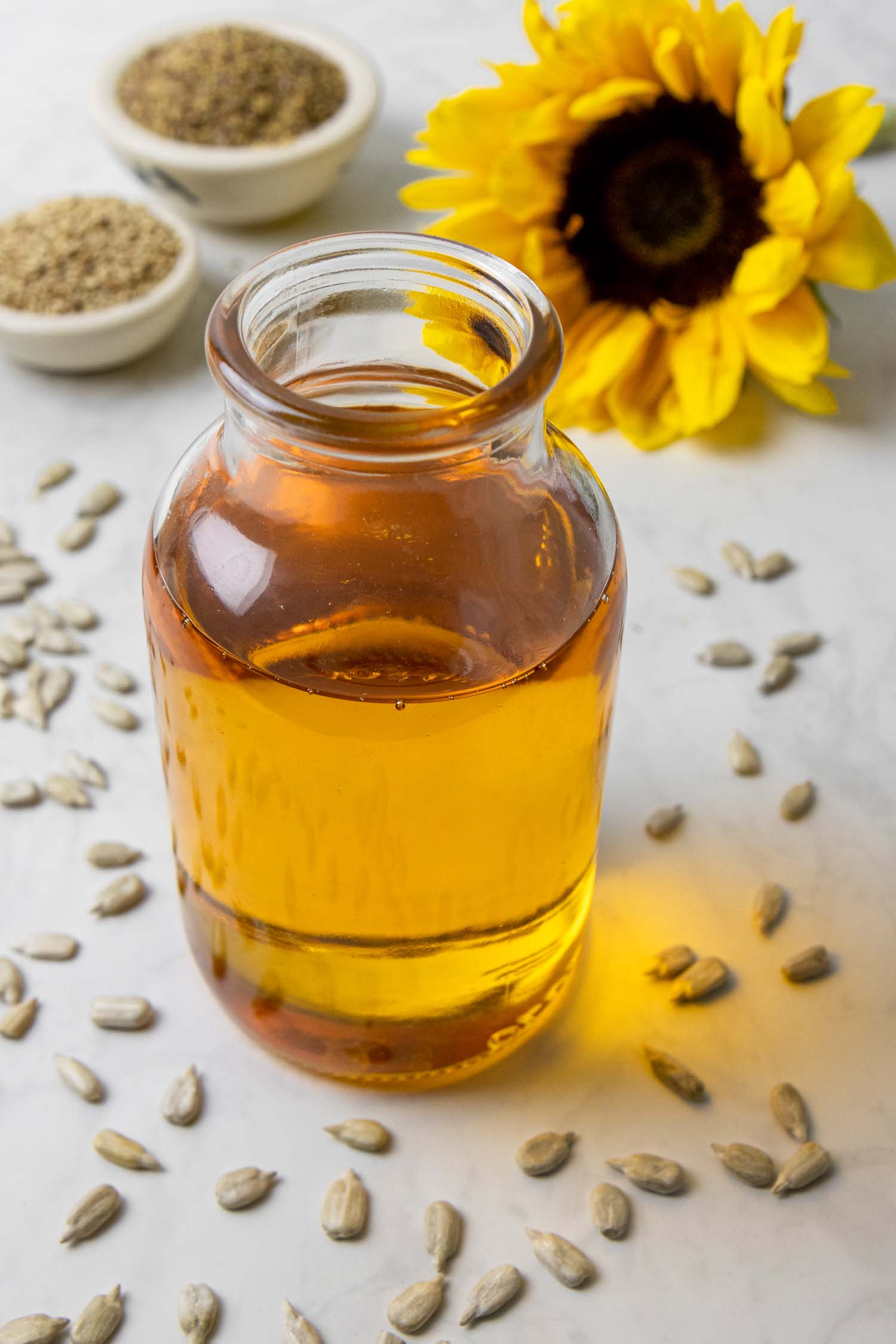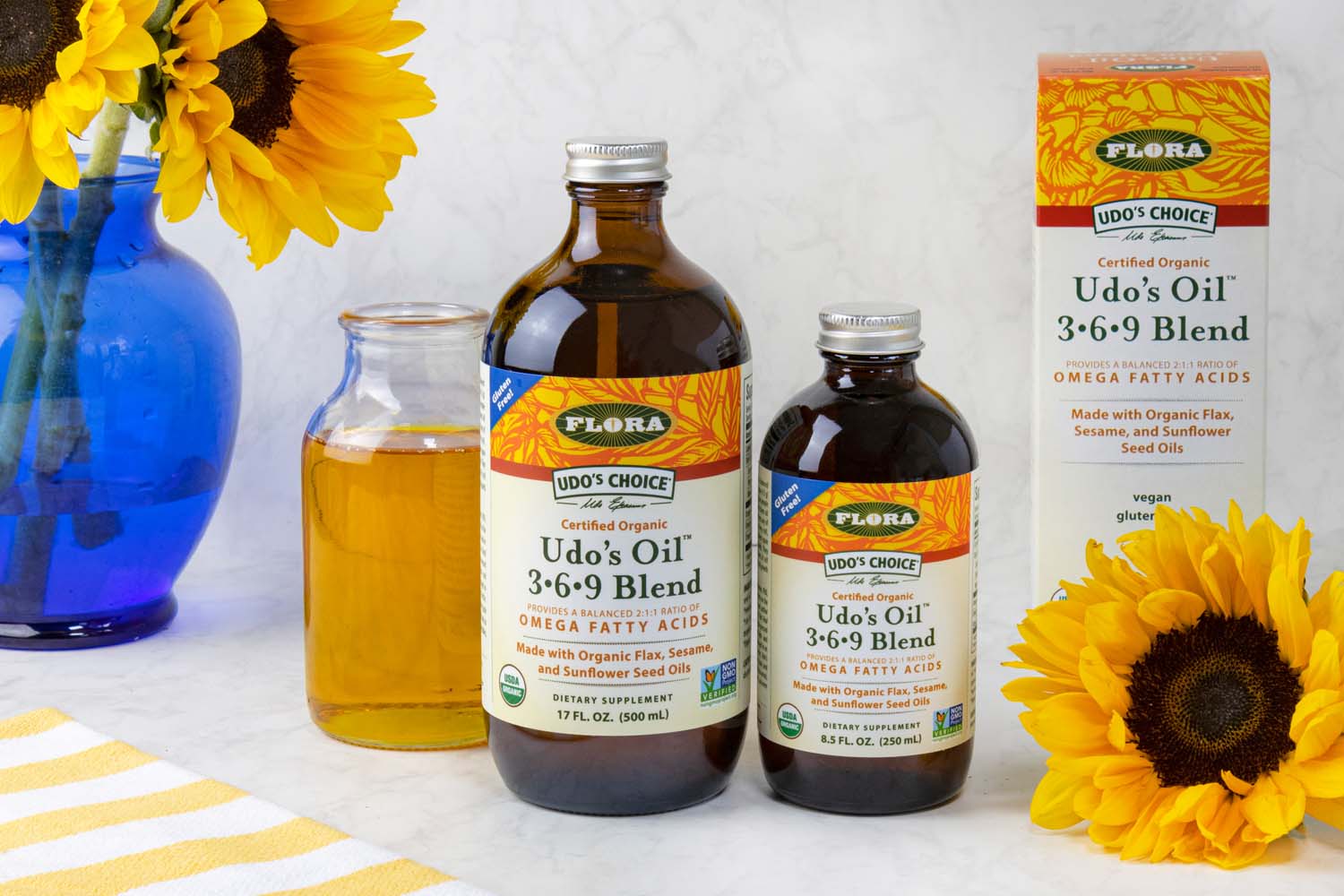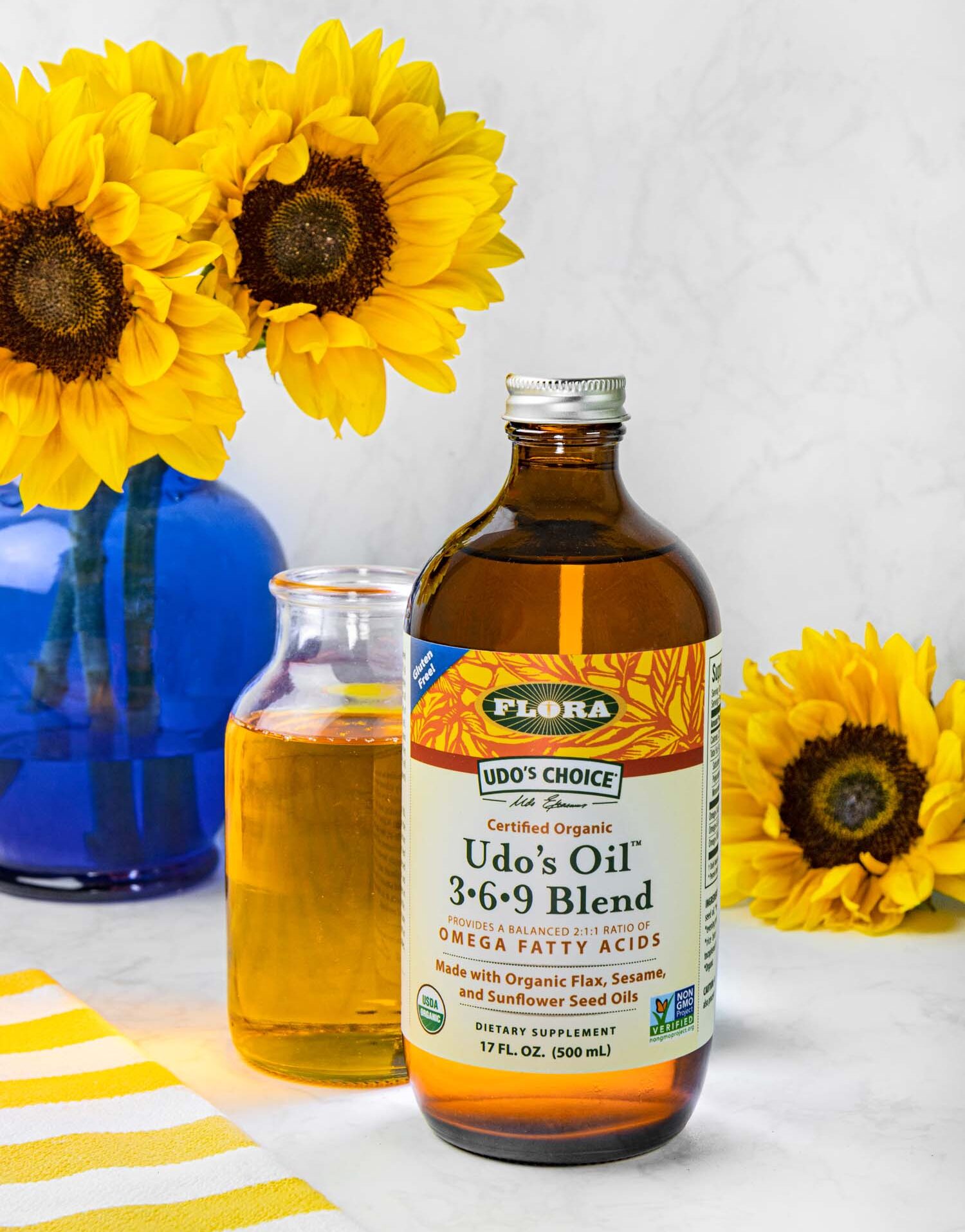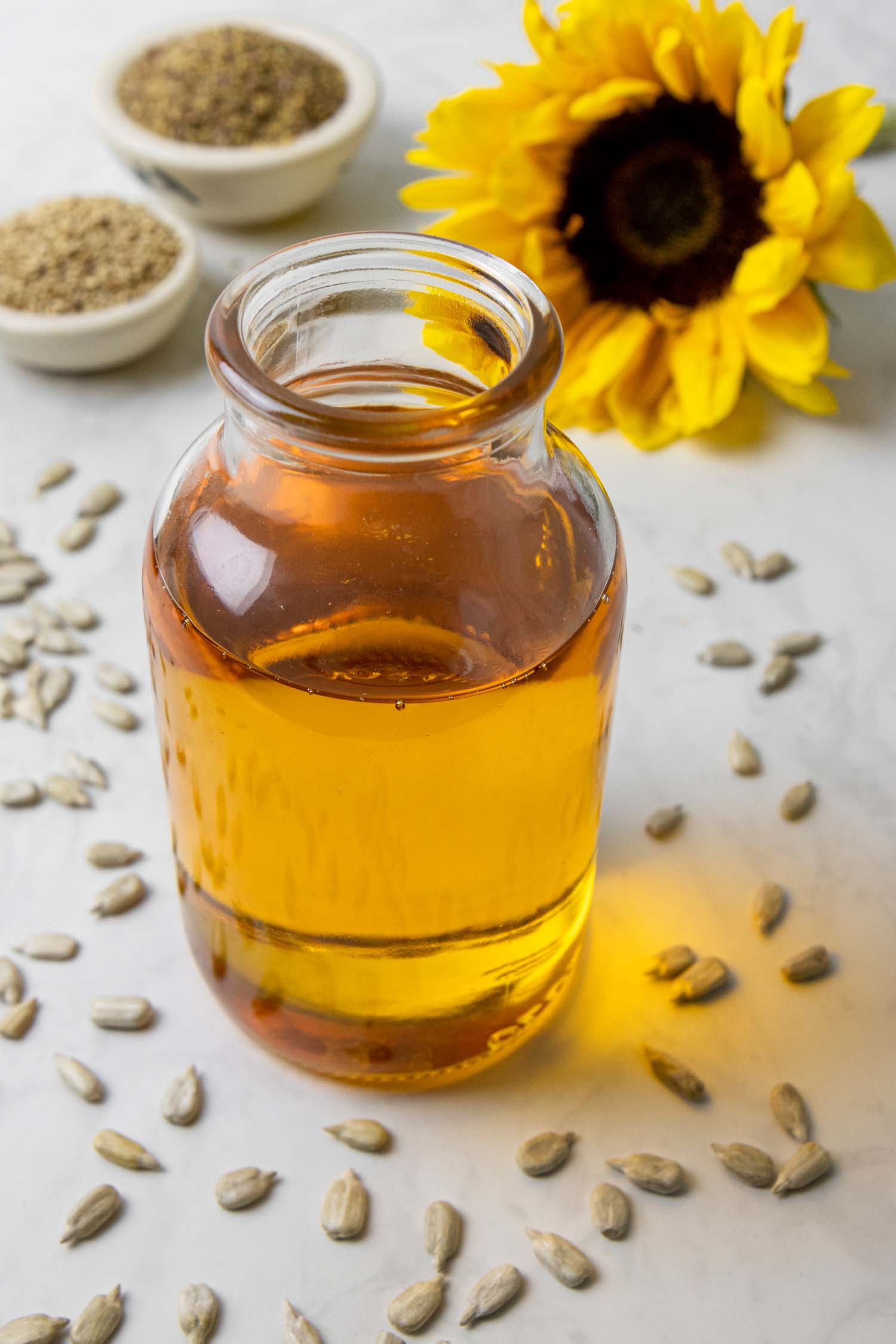If you’ve been scrolling through health and wellness content lately, you’ve probably seen some scary headlines about seed oils like soybean, corn, canola, sunflower, and cottonseed. Words like “toxic” and “poisonous” get thrown around frequently, but the truth is more nuanced than the internet would have you believe. Before you clear out your pantry, let’s take a step back and examine what science tells us.
While you should definitely steer clear of certain seed oils, research shows some are incredibly beneficial for your health. You just need to know what to look for.
We’ll explore why industrially processed seed oils should be avoided at all costs and what to choose instead. We’ll also discuss why blends like Udo’s Oil are what we all need more of: made the way seed oils should be made – using cold-pressed, organic methods that preserve all the nutritional benefits while providing the perfect balance of omega fatty acids your body needs.
Let’s separate fact from fear-mongering and help you make informed, healthy choices.
What Are Seed Oils, Really?
Seed oils are vegetable oils extracted from the seeds of a variety of plants.
Cheap, highly processed, and marketed as “heart-healthy,” refined seed oils have become a staple in modern cooking, food manufacturing, and even beauty products.
Common examples include:
- Soybean oil
- Corn oil
- Canola (rapeseed) oil
- Sunflower oil
- Safflower oil
- Cottonseed oil
- Grapeseed oil
- Rice bran oil
Today you can find them in nearly every packaged item, including chips, cookies, salad dressings, protein bars, baby formula, and even “health” foods. It wasn’t always this way though.
The shift began in the early 1900s when companies like Procter & Gamble began refining cottonseed oil, originally used for machine lubrication, into a cooking fat called Crisco. This marked the beginning of seed oils infiltrating our food system, not because they were healthier, but because they were cheaper to make and more profitable.
Now, a growing body of evidence points to these industrially refined seed oils doing more harm than good.
But not all seed oils are inherently harmful. In fact, cold-pressed organic seed oils can be a healthy addition to our diets.
The Real Problem Isn’t What You Think
Before we dive into the controversy around seed oils, let’s talk about what the body needs to thrive.
Every cell, tissue, gland, and organ in your body relies on two essential fatty acids:
 Alpha-linolenic acid (ALA): an omega-3 fatty acid
Alpha-linolenic acid (ALA): an omega-3 fatty acid
 Linoleic acid (LA): an omega-6 fatty acid
Linoleic acid (LA): an omega-6 fatty acid
These polyunsaturated fats (PUFAS) are essential because your body can’t make them on its own.
You need to get them through the food you eat. In modern diets, seed oils are the most popular sources of these essential fatty acids (mostly omega-6), along with foods like fatty fish, walnuts, chia and flax.
And they’re key for:
- Brain function and mood
- Hormone production
- Immunity
- Heart health and blood pressure
- Cell membrane structure, signaling, and fluidity
Modern diets, especially those high in processed seed oils, often tip the scale dramatically toward omega-6’s leaving our bodies low in omega-3’s.
The Misunderstanding about Omega Fatty Acid Ratios
About a century ago, before industrial seed oils, humans ate a much healthier omega-6 to omega-3 ratio, ranging from 4:1 to even 1:4 depending on region and lifestyle.
Today, because industrial seed oils like soy and canola have flooded the modern food supply, that ratio has skyrocketed to about 20:1. So, even if you’re not cooking with them at home, industrial seed oils used in restaurants and prepared foods can contribute to the excess of omega-6 fatty acids in your diet, without enough omega-3 fatty acids for balance.
Here’s why it matters:
Normally, the body relies on antioxidants and anti-inflammatory compounds – especially omega-3s – to keep free radicals (unstable molecules that can damage cells) under control.
But when omega-6s are too high and omega-3s too low, this balance tips. The body struggles to neutralize those radicals quickly enough. The result is oxidative stress, which quietly wears down tissues.
When your body can’t repair itself, it advances aging and raises the risk of chronic conditions like heart disease, insulin resistance, obesity, autoimmune disorders and more.
While the amount and balance of the omegas in the oils you’re eating is vitally important, the source and quality of those EFAs you’re getting are equally important.
Omega Balance is Important, But It Doesn’t Tell the Whole Story
Today, much of the seed oil debate in the media focuses purely on the high concentration of omega-6 fatty acids compared to omega-3 fatty acids. While some research suggests that excessive omega-6 intake may put more systemic stress on our bodies, leading to poor health, there is still a body of research out there that says they’re fine.
Here’s the problem: these studies often oversimplify the science and don’t account for how these seeds are grown with pesticides, industrially and chemically processed into oils stripped of nutrients, stored in plastic that leach toxins into the oil, and are then form even more toxic compounds when heated during cooking.
When we eat seed oils with fats damaged by heat or processing, it’s like inviting chaos into our cells. Damaged fats from heavily processed oils can get absorbed into our cell membranes, disrupting fluidity and flexibility. This makes it harder for cells to communicate, absorb nutrients, and flush out toxins. Key functions for a healthy body that can easily repair itself.
This imbalance can quietly wear down our health from the inside out.
And it’s why adding some food omega-3s to your diet won’t undo the damage from oxidized omega-6s in processed seed oils. The most effective approach? Eliminate commercial seed oils altogether and replace them with oils that are truly nourishing.
If you’re still deciding whether you want to keep eating these industrial seed oils, we have to look closer at how these oils get from seed to skillet. It may shock you.
But you also may be surprised to learn some seed oils stand out from the crowd as heroes for your health.
Problems Start in the Soil
Most commercial seed oils don’t begin with pristine plants grown in nutrient-rich soil.
Instead, they’re typically derived from genetically modified (GMO) crops like soy, canola, and cottonseed, grown in depleted soil and treated with petrochemical fertilizers, synthetic pesticides, and glyphosate, a widely used herbicide.
Glyphosate has been classified by the International Agency for Research on Cancer (IARC) as “probably carcinogenic to humans.” And research has linked glyphosate exposure to health issues like:
- Disruption of the gut microbiome
- Hormonal interference and fertility issues
- Increased risk of non-Hodgkin lymphoma (especially in agricultural workers and communities near sprayed fields)
While regulatory agencies continue to claim GMOs and glyphosate are safe within certain limits, many consumers choose to avoid them because of concerns about long-term health effects and their impact on the environment.
The Way Seed Oils Are Processed Isn’t Pretty Either
The way most commercial oils are processed turns them into something your body barely recognizes as food. They’re subjected to a series of industrial steps designed to make them cheap, shelf-stable, and flavorless.
Perfect for processed foods, but not ideal for your health, think:
- High-heat extraction using chemical solvents
- Refining stages including degumming, bleaching, deodorizing, winterizing, and defoaming
- Storage in thin plastic containers that can leach and go rancid (often months or years before use)
Each step strips away natural nutrients like vitamin E, polyphenols, and essential fatty acids, while increasing the oil’s oxidative instability. This makes it more prone to rancidity and the formation of harmful compounds that can lead to chronic disease.
By the time these oils hit store shelves or fast food fryers, they’ve already been transformed for the worse. Their original nutritional value is erased, and their molecular structure is altered in ways that make them harder for your body to metabolize.
While more studies are needed, this could help explain why these oils are linked to:
- Inflammation
- Metabolic dysfunction
- Cardiovascular risk
 Don’t Forget: When studies associate seed oils with chronic disease, they’re often measuring the effects of highly refined, industrial oils and not the rare, unrefined versions that are extracted in a way that helps seeds retain their natural antioxidants and healthy fatty acid balance.
Don’t Forget: When studies associate seed oils with chronic disease, they’re often measuring the effects of highly refined, industrial oils and not the rare, unrefined versions that are extracted in a way that helps seeds retain their natural antioxidants and healthy fatty acid balance.
Seed Oils: Myth vs. Truth


All this confusion has tricked us into fearing all seed oils. So let’s get to the heart of what seed oils really are and aren’t.
Myth #1: All Seed Oils Are Toxic
Truth: Most of the oils lining grocery store shelves – soybean, corn, canola – aren’t just high in omega-6s and low in omega 3 fatty acids. They’re also heavily refined, chemically treated, and stripped of their natural nutrients. But not all seed oils are created equal.
While highly refined versions used in processed foods can contribute to inflammation, cold-pressed and organic seed oils (like flaxseed or hemp) can offer valuable nutrients and healthy fats.
According to Guy Crosby, adjunct associate of nutrition at Harvard T.H. Chan School of Public Health, repeatedly heating unsaturated fats at high temperatures, like those found in restaurant deep-fryers, is a major health concern.
This causes the formation of harmful compounds that can increase the risk of heart disease, certain cancers, and other health problems. And this is after many of these seed oils already contain toxins from production and storage.
Myth #2: All Seed Oils Cause Disease
Truth: Disease risk is influenced by overall diet, lifestyle, and genetics. Not one ingredient. Some research shows excessive omega-6 intake without balancing omega-3s may contribute to poor health
Emerging research suggests that oxidized polyunsaturated fatty acids (PUFAs) from degraded industrial seed oils may accumulate in cell membranes, potentially interfering with fat metabolism and cell signaling while increasing susceptibility to oxidative stress and disease.
But not all seed oils are harmful. It’s the ultra-processed, mass-produced oils that are used for high-heat cooking you need to watch out for. Incorporating quality cold-pressed seed oils into your diet can actually be healthy.
Myth #3: All Seed Oils Are Just Empty Calories
Truth: The industrial refining process doesn’t just clean up the oil – it denatures it. By the time these oils reach your plate, they bear little resemblance to the original seed they came from.
High heat and chemical solvents remove antioxidants, damage essential fatty acids, and leave behind a product that’s void of healthy nutrients while leaving it vulnerable to oxidation and rancidity.
But healthy seed oils like flaxseed and chia contain nutrients like omega-3s, vitamin E, and phytosterols that support cellular health.
Phytosterols are plant compounds that can help reduce LDL (“the bad” cholesterol) by interfering with its absorption in the intestines.
Cold-Pressed Oils: The 1% That Gets It Right
Less than 1% of seed oils on the market are produced with care. But here’s where the seed oil conversation turns around.
Unlike refined oils, which are exposed to high heat and chemicals, cold-pressed oils are mechanically extracted without heat or solvents.
This protects the fats and nutrients inside, without added toxins.
Unrefined, cold-pressed oils are:
Nutrient and Antioxidant Powerhouses: These oils have all their fatty acids, vitamins, and natural antioxidants like vitamin E preserved, which help combat oxidative stress.
Free of Toxins and Chemical Residues: Cold-pressed oils are free from solvents and additives, making them a cleaner choice for cooking and wellness.
Flavorful & Functional: Because the oils retain their natural flavor, they’re ideal for drizzling over salads, blending into smoothies, or finishing dishes.
Cold-pressed oils are as close to the seed as it gets. They deliver nourishment in a way your body can recognize.
Remember to always choose cold-pressed oils that are non-GMO and organic. And if you want all your omega fatty acids in the right balance, choose Udo’s Oil 3•6•9 Blend, from Flora Health.
3•6•9 Blend, from Flora Health.
The Best Solution: Start Using Udo’s Oil 3•6•9 Blend.
3•6•9 Blend.
Responsibly processed and cold-pressed, Udo’s Oil 3•6•9 Blend is a safe, clean and healthy alternative to the industrially processed seed oils on grocery store shelves.
Hopefully, it’s clear by now you don’t have to be afraid of all seed oils. You just have to know if the oils you’re eating are safely processed. And ideally, the essential fatty acids from the seed oils you’re getting in your diet are in a balanced, healthy ratio.
What’s the easiest way to do this? Start using Udo’s Oil 3•6•9 Blend.
A clean, functional fat source that respects your biology, it provides all the essential fatty acids your body needs, including hard-to-get omega-3s from plant sources.
What Makes Udo’s Oil 3•6•9 Blend Different From Other Seed Oils?


Unlike conventional seed oils that are often chemically extracted, heat-processed, and stripped of their natural integrity, Udo’s Oil 3•6•9 Blend is crafted to nourish, not inflame.
Here’s what makes Udo’s Oil 3•6•9 Blend shine:
1. Udo’s Oil Has the Ideal 2:1:1 Omega Ratio for Real Balance
Made from a synergistic blend of organic oils including flaxseed, evening primrose, coconut, sesame, sunflower, and rice bran, Udo’s Oil is formulated to correct the unhealthy imbalance of omega-6 fatty acids in our bodies caused by industrially processed seed oils.
This expertly balanced blend delivers omega-3, omega-6, and non-essential omega-9 in the exact 2:1:1 ratio key to maintaining cellular and metabolic health.
2. It’s Organic and Cold-Pressed to Preserve Nutrients
The oils in Udo’s Oil are extracted with care using a gentle, cold-press method that avoids damaging the delicate fats and nutrients in the seed.
This method preserves all the precious nutrients within the oils, including essential fatty acids, vitamins, antioxidants, and other protective plant compounds that help combat free radical damage and support cellular health.
There’s no heat, no chemicals and no compromise in quality. Just clean, nutrient-rich oils in their purest form, exactly as nature intended.
And yes, Udo’s Oil is certified organic, pesticide and toxin-free, and made from high-quality plant sources you can trust.
3. It Has a Richer Flavor
Over-processed, low-quality commercial seed oils have a flat taste, lacking flavor and complexity.
With Udo’s, expect a more robust, nutty, or earthy flavor that’s absolutely delicious.
It’s great in smoothies, with salads, in dressings or dips or simply taken by the spoonful!
4. Udo’s Glass Bottle Matters
Since plastic is permeable to oxygen, commercial oils packaged in clear plastic bottles oxidize and go rancid as they sit on the shelves.
What’s worse, microplastics and toxins like bisphenols, phthalates, and other endocrine-disrupting toxins can leach inside the oil. Especially when exposed to heat and light or stored for long periods of time.
Glass is inert, which means it doesn’t react with food or liquids stored inside.
Udo’s Oil is packaged in a dark amber glass, protecting the oil from light, oxygen, and heat keeping the delicate oils fresh and pure. With Udo’s you never have to worry about the buildup of toxins that can occur with plastic containers.
The Nutritional Power of Each Ingredient in Udo’s Oil
With a carefully balanced omega profile, Udo’s Oil can support optimal cellular function and overall health. Here’s what’s inside.
Flaxseed Oil forms the omega-3 rich foundation of this blend. Flaxseed oil is loaded with heart-healthy omega-3 fatty acids and contains lignans, which are powerful antioxidants. Antioxidants help protect the body against oxidative stress, which can increase the risk of chronic diseases.
Evening Primrose Seed Oil provides gamma-linolenic acid (GLA), a unique omega-6 fatty acid that behaves differently from the ones that get a bad rap. GLA can help support a balanced body, including nerve, skin, brain, skeletal and reproductive health.
Rice Bran Oil contains heart-healthy monounsaturated fats and antioxidants.
Oat Bran Oil contains phytosterols, plant-based compounds that some studies suggest can positively impact cholesterol, supporting overall heart health. It also contains antioxidants that can help protect cells against oxidative stress.
Sesame Seed Oil offers unique antioxidants and cardiovascular benefits. Sesame oil is rich in sesamin and sesamol – antioxidants that may support healthy metabolism, blood sugar balance and promote heart health.
Sunflower Seed Oil is rich in vitamin E and heart-healthy fats.
Organic Coconut Oil adds medium-chain triglycerides for energy and stability to this formula. Medium-chain triglycerides (MCTs) are metabolized differently in the body than other fats and provide a quick source of energy.
With a cult following, fans of Udo’s Oil often report noticeable positive changes within just a few weeks of consistent use.
- Hydrated, clearer skin
- Sustained energy and mental clarity
- Better mood
Udo’s Oil nourishes your body on a deep cellular level.
Practical Tips and Cooking Swaps for Better Health
For the healthiest option, it’s best to always choose cold-pressed seed oils.
If you’re looking to optimize your oil choices, consider these swaps:
- Instead of highly refined seed oils for high-heat cooking, use avocado oil, grass-fed ghee, or coconut oil. Avoid reheating oils repeatedly, which increases oxidation.
- For raw dishes and applications, choose cold-pressed options like extra virgin olive oil, cold-pressed sesame oil, or the nutritionally superior Udo’s Oil 3•6•9 Blend.
- For supplementation, Udo’s Oil provides a convenient, scientifically formulated blend that takes the guesswork out of getting the right balance of essential fatty acids. Don’t waste time trying to balance multiple individual oils.
Udo’s Oil 3•6•9 Blend has it already figured out for you.
 Healthy Cooking Tip: To preserve the delicate nutrients in Udo’s Oil, never heat or cook with it. It’s perfect for salads, dressings, smoothies, or taking directly by the spoonful.
Healthy Cooking Tip: To preserve the delicate nutrients in Udo’s Oil, never heat or cook with it. It’s perfect for salads, dressings, smoothies, or taking directly by the spoonful.
The Bottom Line


You don’t need to fear all seed oils, but you do need to understand them. The real danger lies in how they’re grown, processed, stored, and consumed. Industrial seed oils are a modern invention, and their widespread use has reshaped our health and environment in ways we’re only beginning to understand.
If you’re serious about supporting your health, tossing in a few omega-3s won’t cancel out the damage from industrially processed junk seed oils. Cutting out commercial seed oils completely is the smartest move.
Choosing cold-pressed, organic oils is a powerful way to reclaim your health, support sustainable agriculture, and nourish your body with fats it actually recognizes.
For quality and convenience, consider all-in-one solutions like Udo’s Oil. It provides the optimal balance of essential fatty acids in the right ratio and a boost of healthy omega-3’s. It’s a clean, functional fat source that respects your biology and the planet.
Want a healthier way to enjoy the benefits of good fats?
Try Udo’s Oil – a balanced and unrefined blend of omega-3, 6 & 9 from organic seeds that supports energy, brain, and heart health.
*These statements have not been evaluated by the Food and Drug Administration. This product is not intended to diagnose, treat, cure, or prevent any disease.
Citations and References
- https://www.ers.usda.gov/topics/farm-practices-management/biotechnology
- Simopoulos, Artemis P. “The Importance of Maintaining a Low Omega-6/Omega-3 Ratio for Reducing the Risk of Autoimmune Diseases, Asthma, and Allergies.” *Biomedicine & Pharmacotherapy*, vol. 118, no. 5, 2021, pp. 453–459. PubMed Central, https://pmc.ncbi.nlm.nih.gov/articles/PMC8504498/
- Poli, Andrea, et al. “Phytosterols, Cholesterol Control, and Cardiovascular Disease.” *Nutrients*, vol. 13, no. 8, 16 Aug. 2021, p. 2810. MDPI, https://doi.org/10.3390/nu13082810.
- National Institutes of Health, Office of Dietary Supplements. “Omega-3 Fatty Acids: Fact Sheet for Health Professionals.” *U.S. Department of Health & Human Services*, https://ods.od.nih.gov/factsheets/Omega3FattyAcids-HealthProfessional/. Accessed 18 Aug. 2025.
- International Agency for Research on Cancer (IARC). (2015). *IARC Monographs Volume 112: Evaluation of five organophosphate insecticides and herbicides*. World Health Organization. https://monographs.iarc.who.int/wp-content/uploads/2018/06/mono112.pdf
- Harvard T.H. Chan School of Public Health. “Scientists debunk claims of seed oil health risks.” November 22, 2024. https://hsph.harvard.edu/news/scientists-debunk-seed-oil-health-risks/
- Harvard Health Publishing. “Choosing heart-healthy oils for home cooking.” February 1, 2023. https://www.health.harvard.edu/heart-health/choosing-heart-healthy-oils-for-home-cooking
- Marklund, M., Wu, J.H.Y., Imamura, F., et al. “Biomarkers of Dietary Omega-6 Fatty Acids and Incident Cardiovascular Disease and Mortality.” Circulation. 2019;139(21):2422-2436. https://pubmed.ncbi.nlm.nih.gov/30971107/
- Johns Hopkins Bloomberg School of Public Health. “The Evidence Behind Seed Oils’ Health Effects.” June 16, 2025. https://publichealth.jhu.edu/2025/the-evidence-behind-seed-oils-health-effects
- Harris, W.S., Mozaffarian, D., Rimm, E., et al. “Omega-6 Fatty Acids and Risk for Cardiovascular Disease: A Science Advisory From the American Heart Association.” Circulation. 2009;119(6):902-907. https://www.ahajournals.org/doi/10.1161/circulationaha.108.191627
- American Heart Association Professional. “Omega-6 Fatty Acids and Risk for Cardiovascular Disease.” https://professional.heart.org/en/science-news/omega-6-fatty-acids-and-risk-for-cardiovascular-disease
- Parikh, M., Maddaford, T.G., Austria, J.A., et al. “Dietary flaxseed as a strategy for improving human health.” Nutrients. 2019;11(5):1171. https://pubmed.ncbi.nlm.nih.gov/31130604/
- Knorr, R., Hamburger, M. “The clinical advantages of cold-pressed non-raffinated evening primrose oil over refined preparations.” PubMed. 2004. https://pubmed.ncbi.nlm.nih.gov/14729014/
- Wei, Panpan, et al. “Sesame (Sesamum indicum L.): A Comprehensive Review of Nutritional Value, Phytochemical Composition, Health Benefits, Development of Food, and Industrial Applications.” *Nutrients*, vol. 14, no. 19, 2022, article 4079, https://doi.org/10.3390/nu14194079.
- https://jn.nutrition.org/article/S0022-3166(23)00031-7/pdf
- https://health.clevelandclinic.org/seed-oils-are-they-actually-toxic
The post Should You Be Afraid of Seed Oils? Let’s Talk About the Facts appeared first on Better Living.
If you've been scrolling through health and wellness content lately, you've probably seen some scary headlines about seed oils like soybean, corn, canola, sunflower, and cottonseed. Words like "toxic" and
The post Should You Be Afraid of Seed Oils? Let’s Talk About the Facts appeared first on Better Living. Better Living
